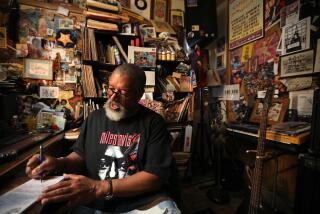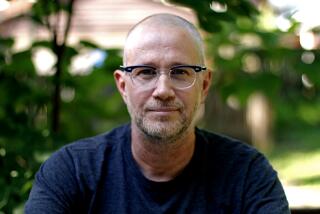Mordecai Richler; Canadian Author and Social Critic
- Share via
Mordecai Richler, the Canadian social critic and novelist best known for chronicling Jewish life in Montreal in books like “The Apprenticeship of Duddy Kravitz,” died Tuesday. He was 70.
Richler, who had surgery on a cancerous kidney in 1998, died in a Montreal hospital of complications from cancer, his family announced.
“Mordecai Richler was the quintessential Canadian man of words, and his loss leaves us grasping for words that can do justice to his importance in Canada’s artistic landscape,” Prime Minister Jean Chretien said in a statement. “He was quite simply one of the most brilliant, original and celebrated artists in Canadian history.”
A stylist of enormous versatility and wit, Richler was one of Canada’s best-known writers outside his home country.
Considered a national treasure by many and a profound irritant by others, Richler wrote magazine and newspaper commentary pieces that were often insightful and pointed.
He infuriated the Quebec nationalist movement in the early 1990s with writings that were critical of separatism.
One Quebec politician tried to ban his book “Oh Canada! Oh Canada! Requiem for a Divided Country,” on the grounds that it was “hate literature.”
In the book, Richler sneered at the province’s “twice as much” signage law, which banned outdoor signs in any language but French while agreeing to let Anglo shopkeepers go on hanging bilingual signs indoors--as long as there was twice as much French lettering as English.
In typical style, Richler wrote that he and his drinking buddies had formed the Twice as Much society in response. They planned to lobby for French to be spoken twice as loudly as English; for hockey fans to cheer Francophone players twice as hard as English-speaking ones; for restaurants to serve twice as much food to patrons who order in French, and so on.
Richler professed surprise at the flap over “Oh Canada!” but his position on the separatism matter was clear.
“He was bitter about what he saw as the extreme right-wing French takeover of Quebec,” novelist Herbert Gold, a longtime friend, said Tuesday. “He wrote books and op-ed pieces attacking that. He had a feisty style and was ferociously opposed to such provincialism.”
Richler also took aim at the leading Canadian politicians of the day, including Prime Minister Brian Mulroney, when he left office in 1993.
“Mulroney, to give him credit, was a consummate pro, a mellifluous fibber with the built-in advantage of never once being inhibited by shame,” Richler wrote. “In office, Mulroney lied regularly, even when it wasn’t necessary, just to keep in shape.”
Richler’s novels dealt mainly with growing up Jewish in Canada, which he equated with “emerging from the ghetto twice,” a reference to being both a religious minority and being from the cultural enigma that is Canada.
He wrote 10 novels, scores of magazine pieces, children’s books and screenplays. In 1974, he was nominated for an Academy Award for his adaptation of “Duddy Kravitz,” which starred Richard Dreyfuss. He wrote the screenplay for “Life at the Top,” starring Laurence Harvey and Jean Simmons. He also did uncredited work on “Room at the Top,” and years later wrote the screenplay for “Fun With Dick and Jane.”
His novels won numerous prizes in Canada. Two of his works--”St. Urbain’s Horseman” and “Solomon Gursky Was Here”--were short-listed for England’s Booker Prize. In 1997, Richler’s novel “Barney’s Version” won Canada’s Giller Prize.
Born in Montreal, the only child of a religious family of immigrants from Russia, Richler grew up on St. Urbain Street, which became a lively scene in many of his works. He studied the Talmud as a youth with the thought of becoming a rabbi, but gave that up after becoming intrigued by the wider world of books and writing he found in school.
Richler tried college, attending Sir George Williams College in Montreal but in short order cashed in an insurance policy and sailed for Europe to live the expatriate experience in Paris.
Years later, Richler would recall Paris in the 1950s as his true education. “St. Germain des Pres was my campus, Montparnasse my frat house, and my two years there are a sweetness I retain, as others do wistful memories of McGill or Oxford,” he wrote in the essay “A Sense of the Ridiculous.”
And though the Paris experience was expansive, Richler was forced to return to Canada when he ran short of funds.
He returned, however, with his first novel, “The Acrobats,” which was published in Canada in 1954. That same year, Richler moved back to Europe, this time to London, where he was quickly married and divorced and continued to find his voice as a writer. He stayed in Europe for the next 18 years, returning to Canada in 1972.
“The Apprenticeship of Duddy Kravitz,” his fourth and best-known novel, was published in 1959. A coming-of-age novel, it concerns a Jewish-Canadian teenager who misinterprets his grandfather’s warning that “a man without land is nobody” and goes about manipulating his friends and family to achieve that end. And though Duddy finally succeeds in his quest, he finds himself spurned by the very people he wished to impress.
Years later, A.R. Bevan, writing a new introduction to Richler’s book, noted that Duddy “is a modern ‘antihero’ (something like the protagonist in Anthony Burgess’ ‘A Clockwork Orange’) who lives in a largely deterministic world, a world where decisions are not really decisions and choice is not really choice.”
The book sold just 2,000 copies in Canada in its first year and fewer in the United States. But by the time the book was filmed, it had become a high school textbook in Canada and sales were brisk.
Gold, who also lived in Paris in the early 1950s and met Richler there, recalled his Canadian friend as “an incredibly funny writer,” and said he had an enormous impact on North American letters.
“Like American Jewish writers--Malamud, Bellow, Roth--he was of a generation that faced being Jewish directly, and he wrote terrific comedy about Jewish immigrants in Canada,” Gold said Tuesday from his home in San Francisco. “He was the most accessible writer of his generation to give a picture of that funny, English-speaking, Jewish world.”
Gold said Richler described the world of Jewish Montreal in a unique way.
“He was entertaining and did what Dickens and Balzac did to bring us the news of the world. He gave us a sense of the family life and the interconnections of a whole community, which was disappearing because so many of the people who clung to the English language had moved to Toronto.”
Richler’s escape from the shadows of the American literary scene would help other Canadian writers like Michael Ondaatje, Alistair MacLeod and Margaret Atwood.
In comments Tuesday to the Canadian press, Atwood, author of “The Handmaid’s Tale,” among other works, called Richler “a fine novelist, a brilliant satirist and an invaluable commentator on the absurdities of national life.
“He was a consummate professional; he was also a decent and generous man, loved by his friends and respected by his fellow writers,” she said. “He will be very much missed.”
Richler is survived by his wife of 40 years, Florence, and five grown children.
The family requested that contributions be made in his name to the Canadian Cancer Society. Funeral services will be private.
Times Deputy Book Review Editor Thomas Curwen contributed to this report.
More to Read
Sign up for Essential California
The most important California stories and recommendations in your inbox every morning.
You may occasionally receive promotional content from the Los Angeles Times.











